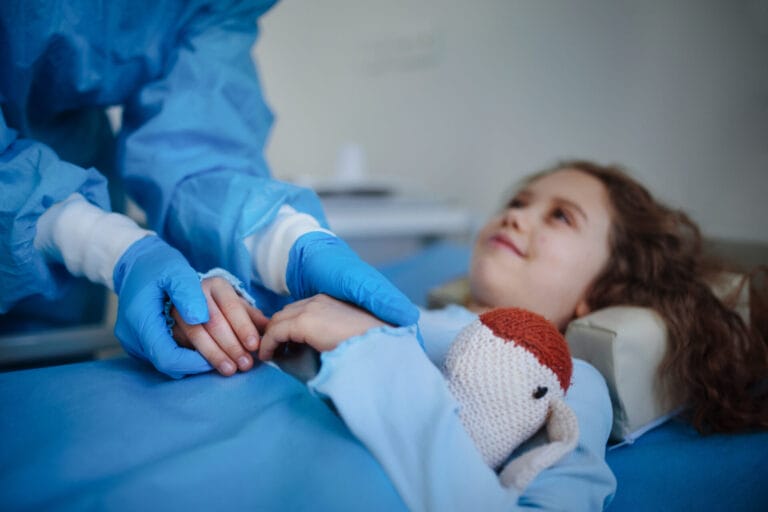Comprehensive Guide to Pediatric Hernias: Causes and Solutions
Pediatric hernias can be a cause of concern for parents. Fortunately, it is a treatable condition.
This comprehensive guide aims to provide clarity for parents dealing with pediatric hernias. It will help you understand the causes, symptoms and available surgical solutions for the condition so you can make informed decisions about your child’s health.
Understanding Pediatric Hernias
Hernia occurs when an organ or tissue protrudes through a weak spot or opening in the muscle or connective tissue that normally holds it in place. In children, hernias often develop in the abdomen or groin areas. The most common types of pediatric hernias are the following:
- Inguinal Hernia: This type of hernia occurs in the groin area and is more common in boys. It happens when a part of the intestine protrudes through a weak spot in the abdominal wall or inguinal canal.
- Umbilical Hernia: Found at the belly button, umbilical hernias result from incomplete closure of the abdominal muscles around the umbilical cord after birth. They are more common in infants.
Causes of Pediatric Hernias
Several factors contribute to the development of pediatric hernias, including:
- Most are “congenital” meaning that some hernias are present at birth. Alternatively, children are born with a predisposition to develop a hernia in childhood. This may include being born prematurely increases the likelihood of inguinal and umbilical hernias
- Genetic Predisposition: Hernias may run in families, suggesting a genetic component.
Symptoms of Pediatric Hernias
Identifying the symptoms of a pediatric hernia is crucial for timely diagnosis and treatment. Common signs of this condition include:
- Visible Bulge: A noticeable bulge or swelling in the abdomen or groin area, especially when your child cries, coughs, or strains.
- Pain or Discomfort: Your child may experience pain or discomfort, particularly around the bulging area.
- Difficulty with Bowel Movements: Hernias can cause constipation or other bowel movement issues.
Pediatric Hernia Surgery
When conservative management fails to resolve a pediatric hernia, your doctor may recommend surgery. This procedure aims to repair the weakened part of the abdominal wall or groin area and prevent the hernia from recurring.
Key aspects of pediatric hernia surgery include:
- Preoperative Evaluation: Before surgery, your child’s pediatric surgeon will conduct a thorough evaluation. It includes a physical examination, imaging studies, and a medical history review.
- Surgical Procedure: Children typically undergo surgery under general anesthesia. The surgeon will make a small incision near the hernia site, reposition the protruding tissue back into place, and strengthen the weakened area with sutures or a surgical mesh.
- Recovery and Postoperative Care: Your doctor will closely monitor your child for complications after surgery. They may experience mild discomfort, which can be managed by prescribed pain medications. Most children can resume normal activities within a few days to weeks following surgery, depending on the pace of their recovery.
- Potential Risks and Complications: Although rare, complications of pediatric hernia surgery may occur. They include infection, bleeding, or recurrence of the hernia. Your pediatric surgeon will discuss these risks and guide you on minimizing them.
Conclusion
Navigating pediatric hernia surgery can be daunting for parents. However, you must understand the causes, recognize the symptoms and learn about the key aspects of surgery to make an informed decision.
If your child has been diagnosed with hernia, consult a qualified pediatric surgeon specializing in pediatric hernia surgery. They can provide personalized guidance, address your concerns, and ensure the best possible outcome for your child’s health and well-being.
For more information or to schedule a consultation with our experienced pediatric surgical team, visit Pacific Coast Pediatric Surgery. We provide compassionate care and comprehensive surgical solutions tailored to the unique needs of children with hernias.
Contact us today to learn how we can assist your child on their journey to hernia recovery.








